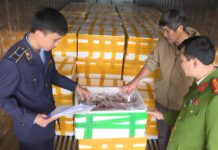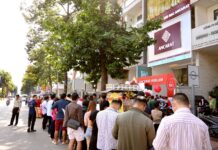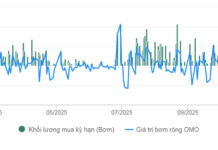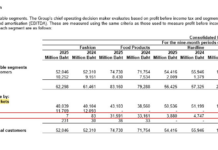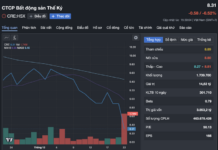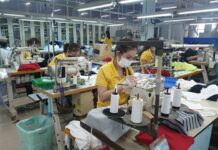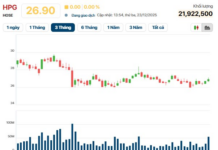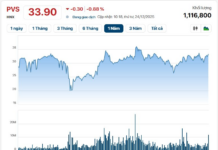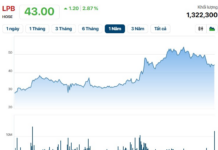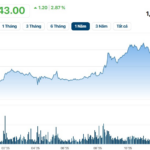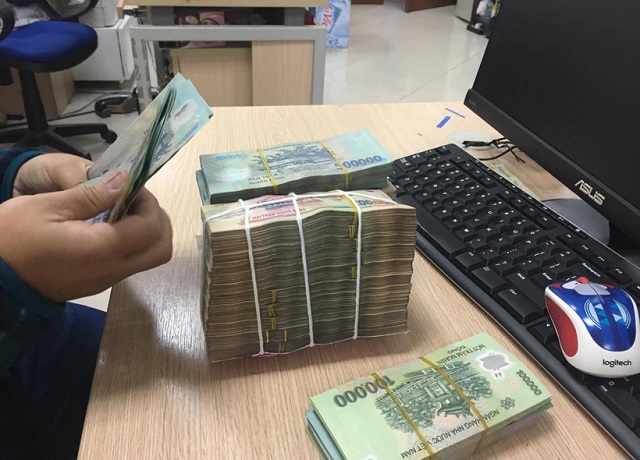
Finding ways to untangle the VND 40,000 billion interest rate support package. (Photo: Vietnam+)
|
In January 2022, the National Assembly passed a resolution on fiscal and monetary policies to support the economic recovery and development program. The resolution included a 2% interest rate support package with a maximum scale of VND 40,000 billion for enterprises, cooperatives, and business households that are capable of repaying loans and recovering from the COVID-19 pandemic. The package also aimed to support loans for renovating old apartment buildings and constructing social housing and worker accommodation.
However, as of now, the 2% interest rate support policy through commercial banks has only disbursed 3.05%, equivalent to VND 1,218 billion. The remaining amount of unused capital is approximately VND 38,800 billion.
Enterprises fear inspections
At the beginning of 2022, when the support package was introduced, Tiross Vietnam Joint Stock Company was offered a loan under this program. However, as the company maintained stable operations, they did not wish to take advantage of the 2% interest rate reduction.
Mr. Nguyen Dang Hoan, Chairman of the Board of Directors of Tiross Vietnam Joint Stock Company, shared: “This interest rate support package is very necessary as many enterprises need assistance. However, our company’s financial situation remains safe. Therefore, even though many credit institutions offered us this package, we declined and wanted to leave it for enterprises that need it more.”
In contrast, the Vietnam Export Coir Production and Processing Company was also introduced to the loan package at the time of its introduction. Even though they maintained their export momentum immediately after COVID-19 and confidently met the “recovery capability” criteria, they eventually had to give up on this support package.
Mr. Pham Minh Ton, Director of Vietnam Export Coir Production and Processing Company, said: “There is a lot of paperwork, not to mention the post-disbursement inspection and audit processes. We would definitely need to assign a personnel to handle the paperwork and procedures before and after the disbursement.”
While enterprises face challenges in accessing this package, cooperatives and business households find it even more difficult. They often lack collateral, do not have official invoices as required, or struggle to determine their “recovery capability.” As a result, the implementation of this policy has slowed down and lost the interest of the very beneficiaries it aims to support.
According to a survey by the Vietnam Chamber of Commerce and Industry (VCCI), only 30% of cooperatives are aware of this policy, and only about 2% of enterprises have received loans under this program. This objectively indicates the need to re-evaluate the policy.
The main reason for this situation is that eligible customers choose not to benefit from the policy due to concerns about inspections and audits, especially for enterprises. They weigh the benefits of interest rate support against the costs of monitoring paperwork, complying with post-inspection procedures, and audits by state agencies.
Additionally, customers worry about the possibility of having to refund the supported interest amount if the state agency determines that the supported interest has been included in the company’s profits and distributed as dividends to shareholders.
Governor of the State Bank of Vietnam shares her thoughts
Ms. Nguyen Thi Hong, Governor of the State Bank of Vietnam, stated that Resolution 43 was implemented amid a complex and unpredictable global and domestic context, without any precedents. Due to the conflict between Russia and Ukraine, countries are tightening their monetary policies.
“The government has made resolute efforts to implement programs to overcome difficulties for the economy. Regarding the 2% interest rate support policy, there has never been a program that the State Bank of Vietnam has spent as much time and effort on as this one,” affirmed the Governor.
However, acknowledging the low results of the program, the Governor explained that this policy aims to support enterprises with recovery capabilities, meaning those capable of repaying loans, rather than providing a solution for all enterprises facing difficulties in the economy.

Many enterprises fear inspections and are reluctant to participate in the VND 40,000 billion credit package. (Photo: Vietnam+)
|
According to the Governor, the capital for lending in this program comes from deposits made by the people. Only the 2% interest rate support program of the Vietnam Bank for Social Policies uses the state budget. Therefore, commercial banks must lend in accordance with current regulations, ensuring debt recovery. As a result, the amount disbursed depends on the enterprises’ calculations.
What are the solutions?
The VND 40,000 billion package is considered to have many regulations that are too restrictive and impractical, leading to low policy effectiveness. Therefore, even with a 6-month extension, it is unrealistic to expect full disbursement of the support package. However, it is crucial to find new approaches to ensure that every disbursed amount is well-utilized.
Associate Professor and Dr. Tran Hoang Ngan, former Director of the Ho Chi Minh City Development Research Institute, pointed out that the goal was to disburse VND 40,000 billion, but only about VND 1,200 billion has been achieved. This is a shortcoming of Resolution 43, and it is necessary to draw lessons from this experience to ensure that future policies are practical and applicable.
To enhance the effectiveness of this policy, many experts have suggested the need for changes to the VND 40,000 billion package to ensure that budget funds are used promptly to support people and businesses in economic recovery.
Dr. Le Duy Binh, Executive Director of Economica Vietnam, stated: “We need to base this on market principles and transform it into a completely commercial transaction. Only then can we expect good disbursement of this 2% package.”
Meanwhile, Mr. Tran Duc Anh, Director of Macroeconomics and Market Strategy at KB Vietnam Securities Company, suggested that there should be regulations and criteria that are stringent enough to prevent state capital from being wasted but also open and encouraging enough to boost the confidence of banks and businesses in utilizing the 2% support package.
The General Director of a large bank also shared that credit institutions have recognized the difficulties of this policy and have proposed to the State Bank of Vietnam to report to the Government about the possibility of converting this credit package into another form of support.
In its report to the National Assembly, the Government emphasized that for the unused capital of this policy after the planned period, the Government will submit to the National Assembly for cancellation of the budget and plan, without mobilizing resources and without increasing the corresponding deficit.
Thuy Ha

